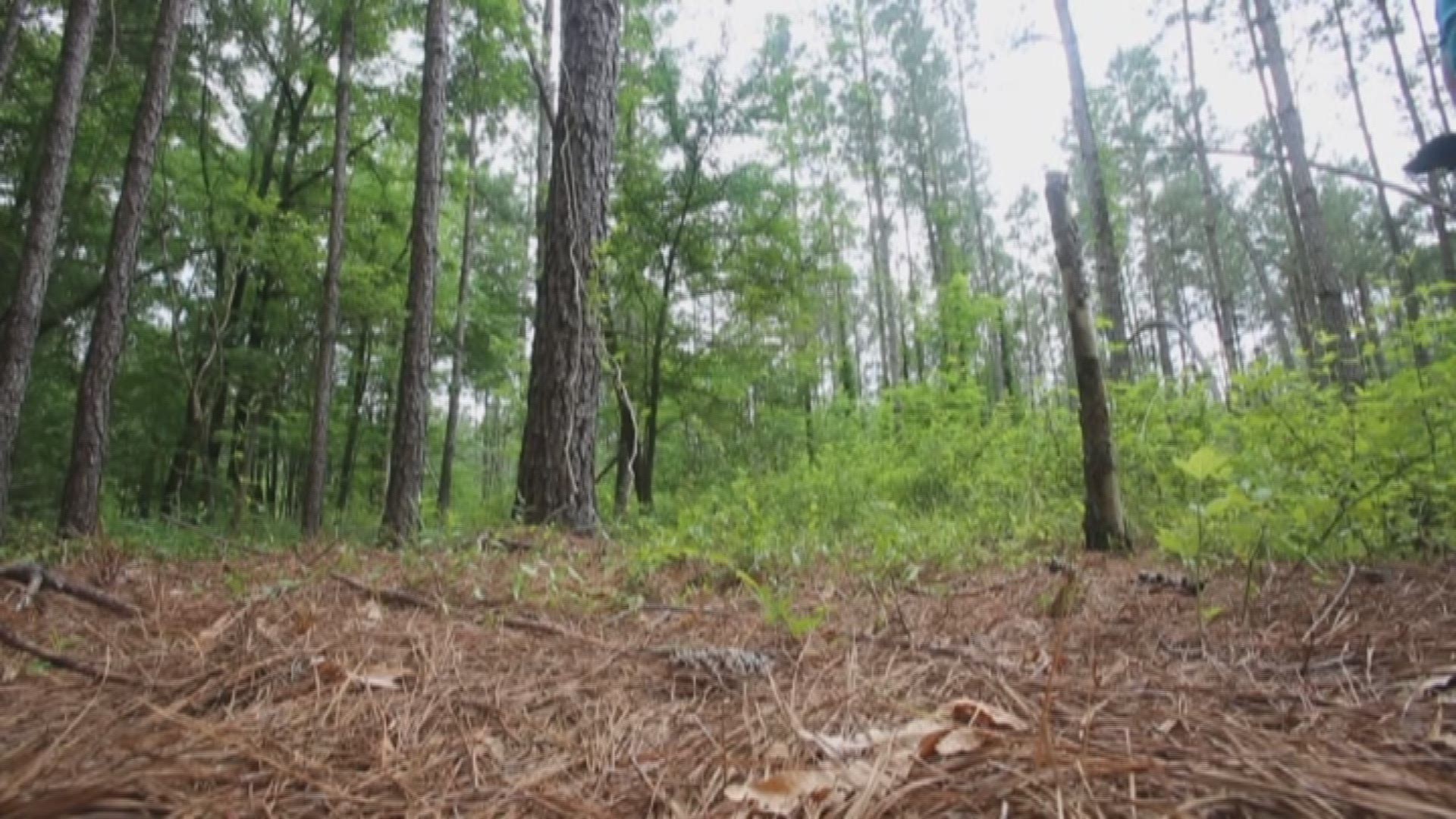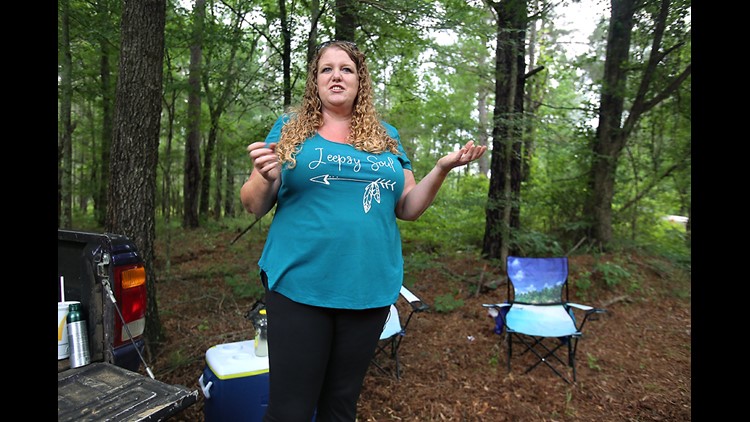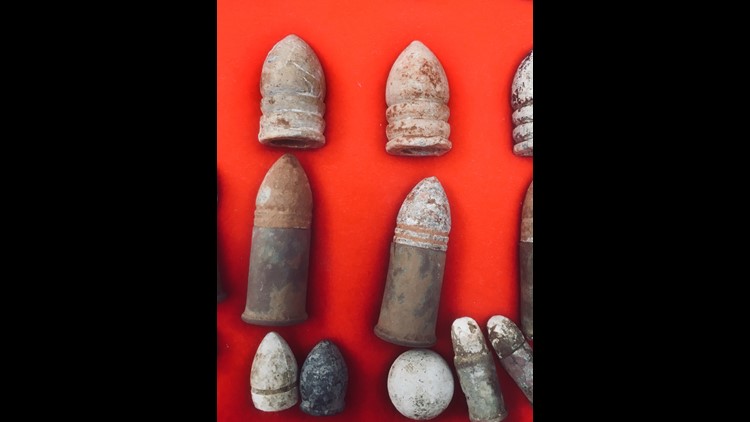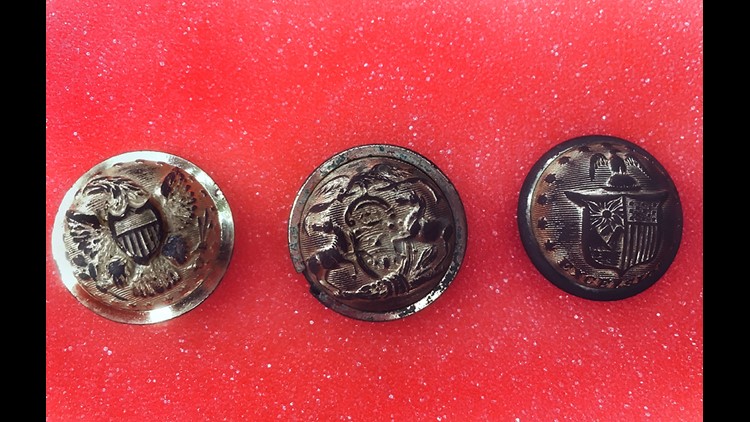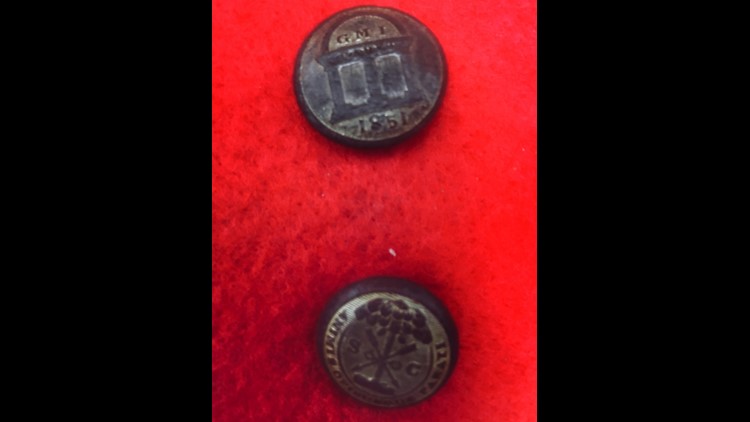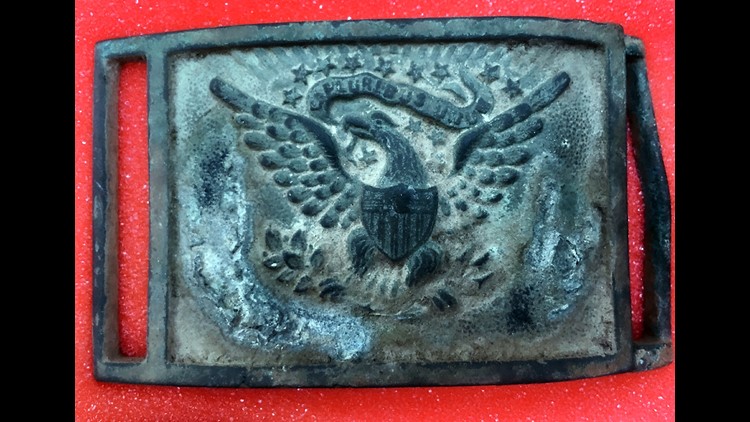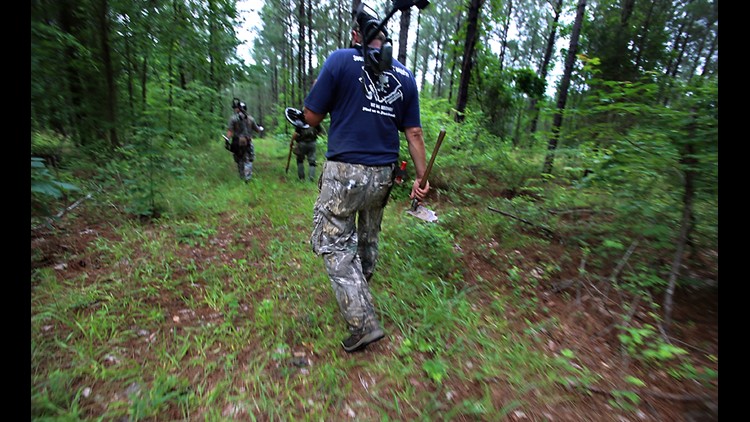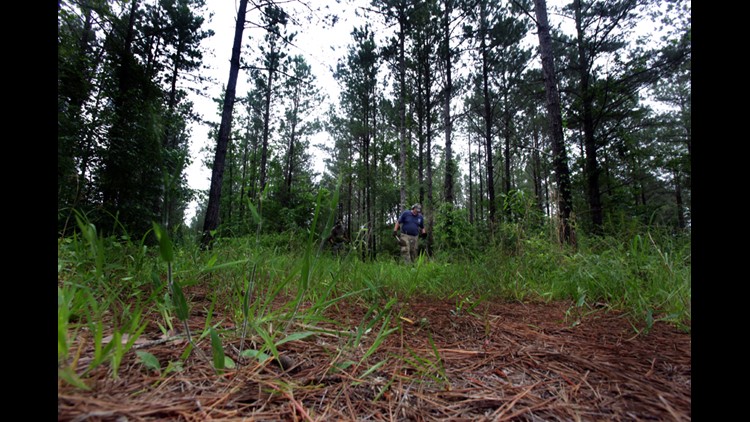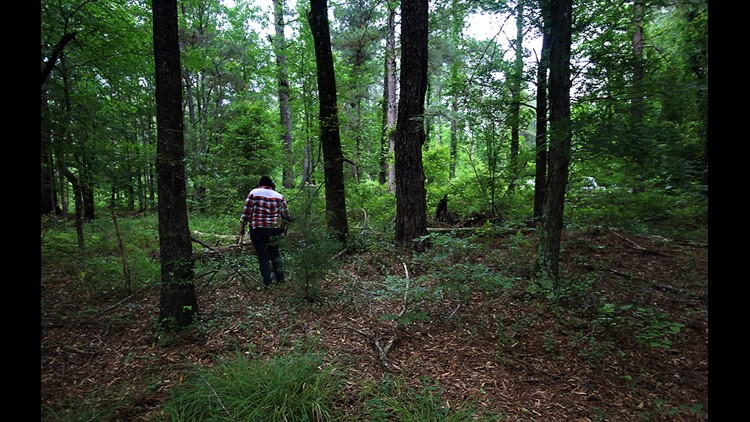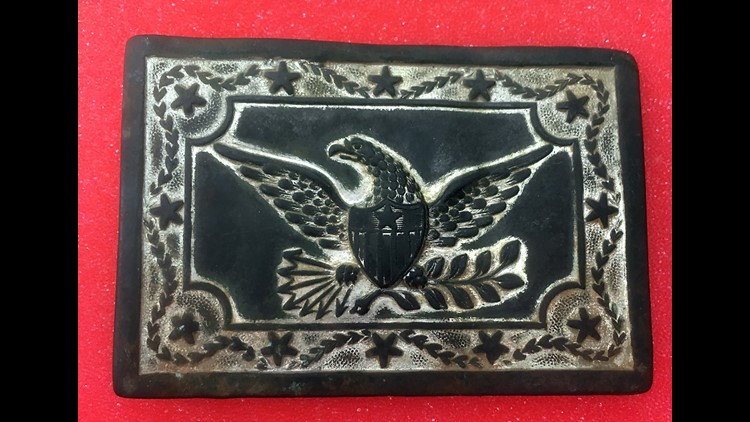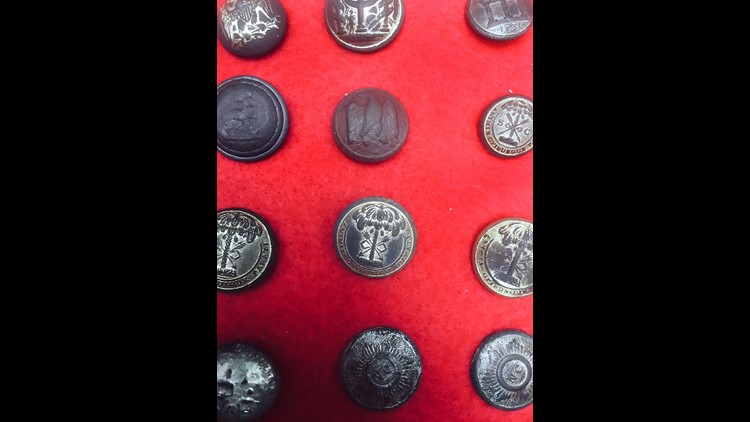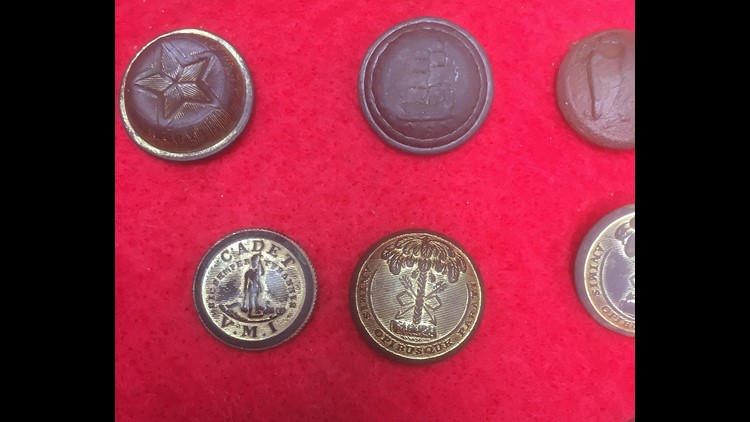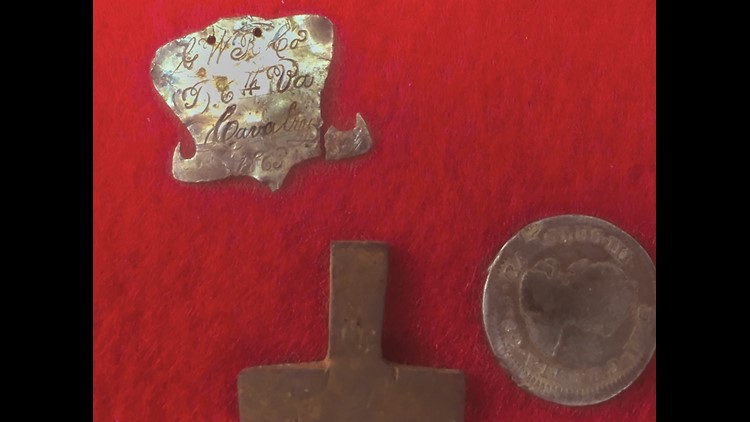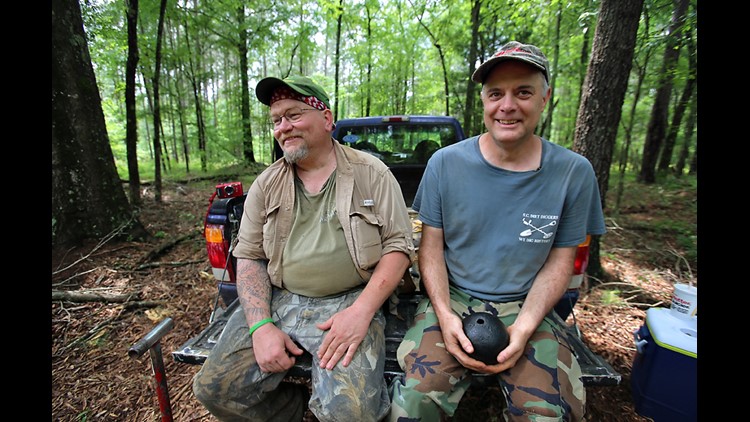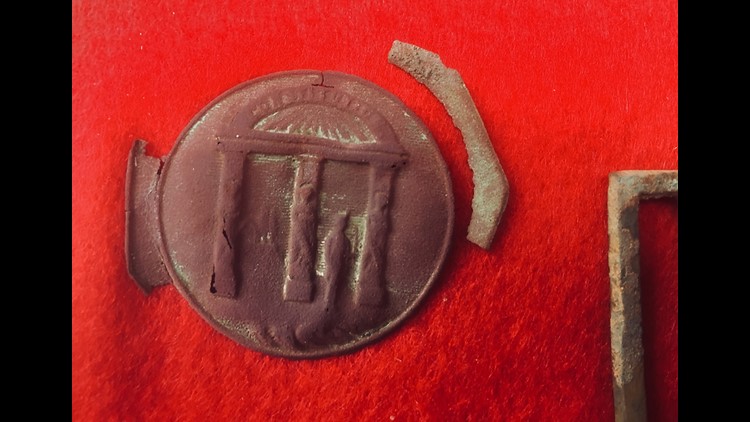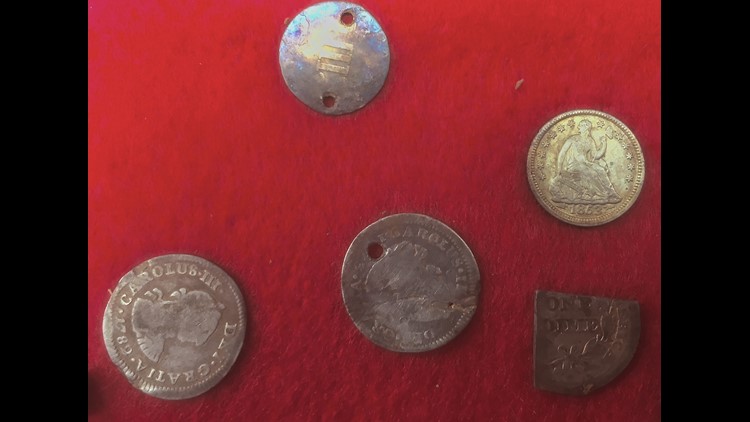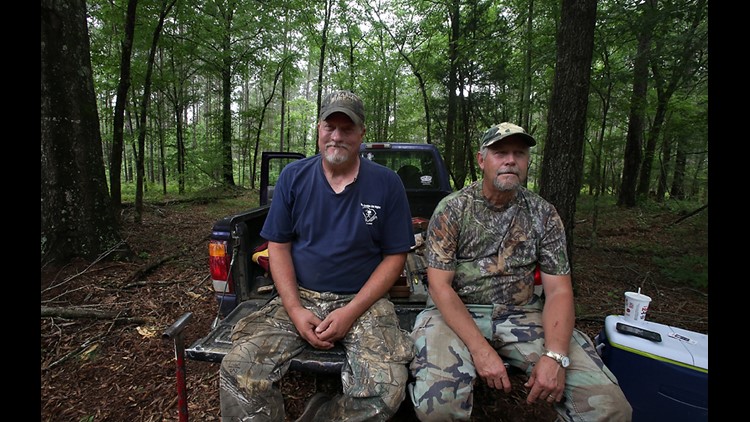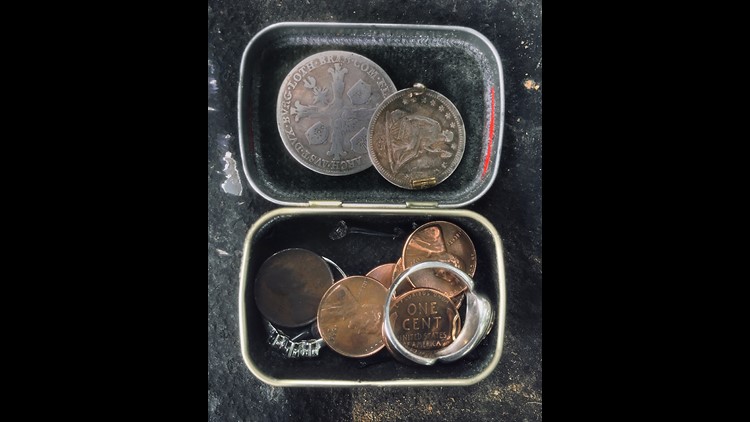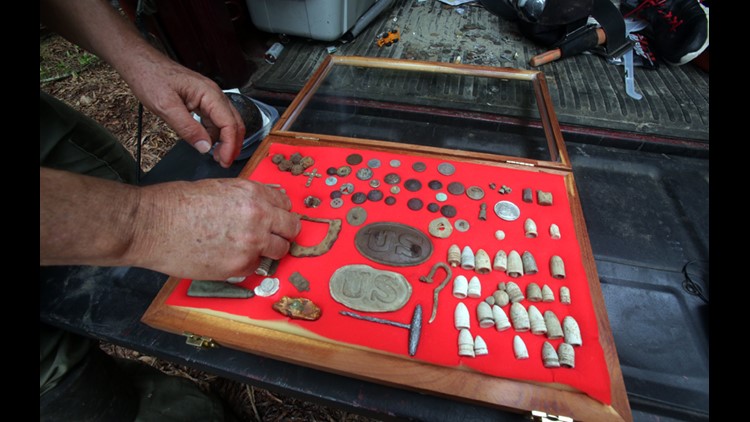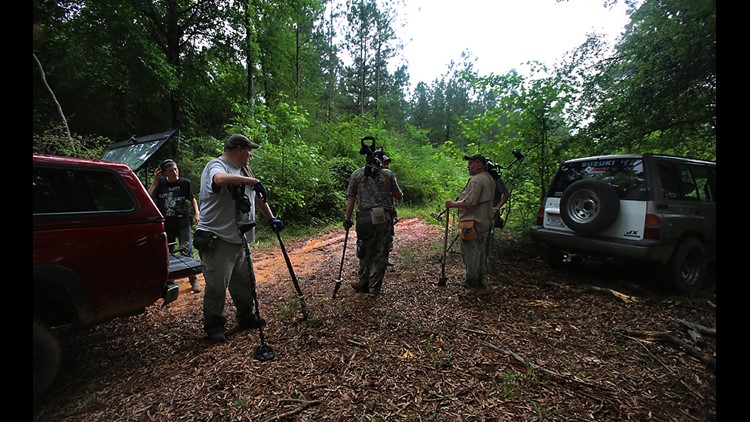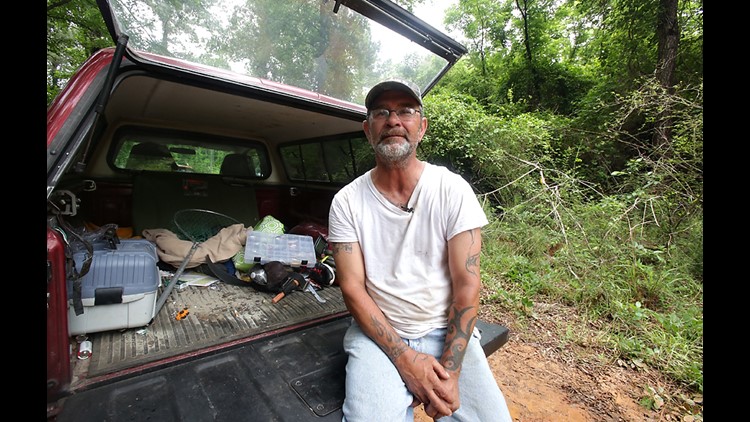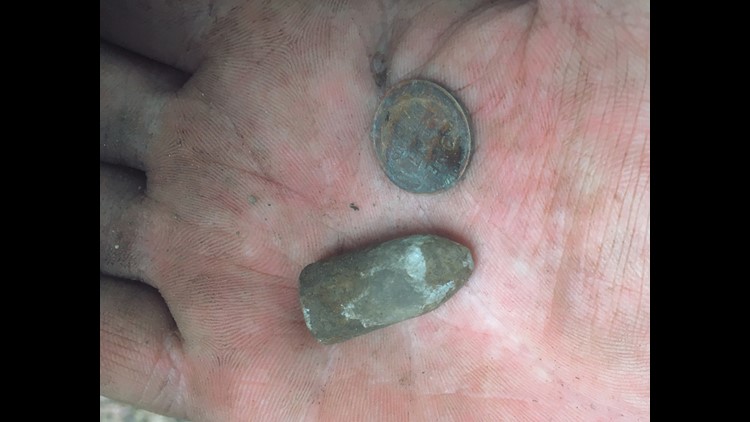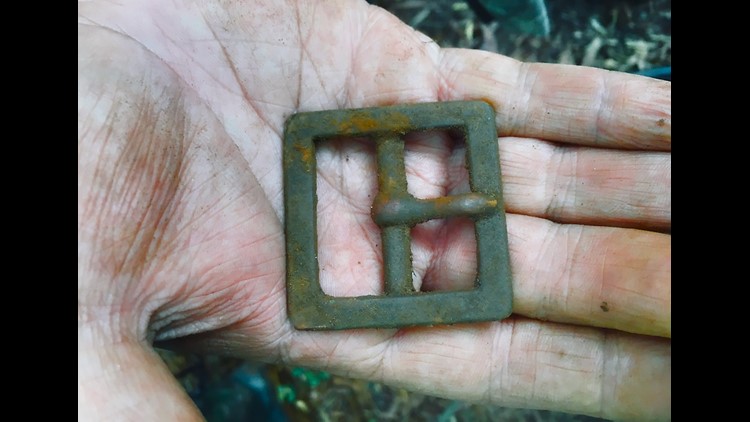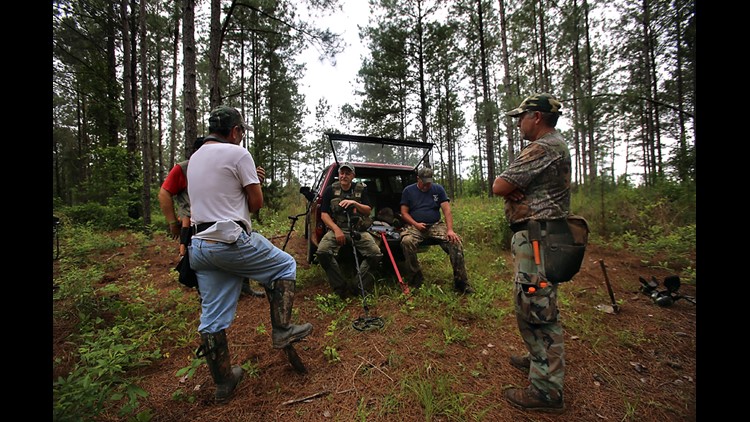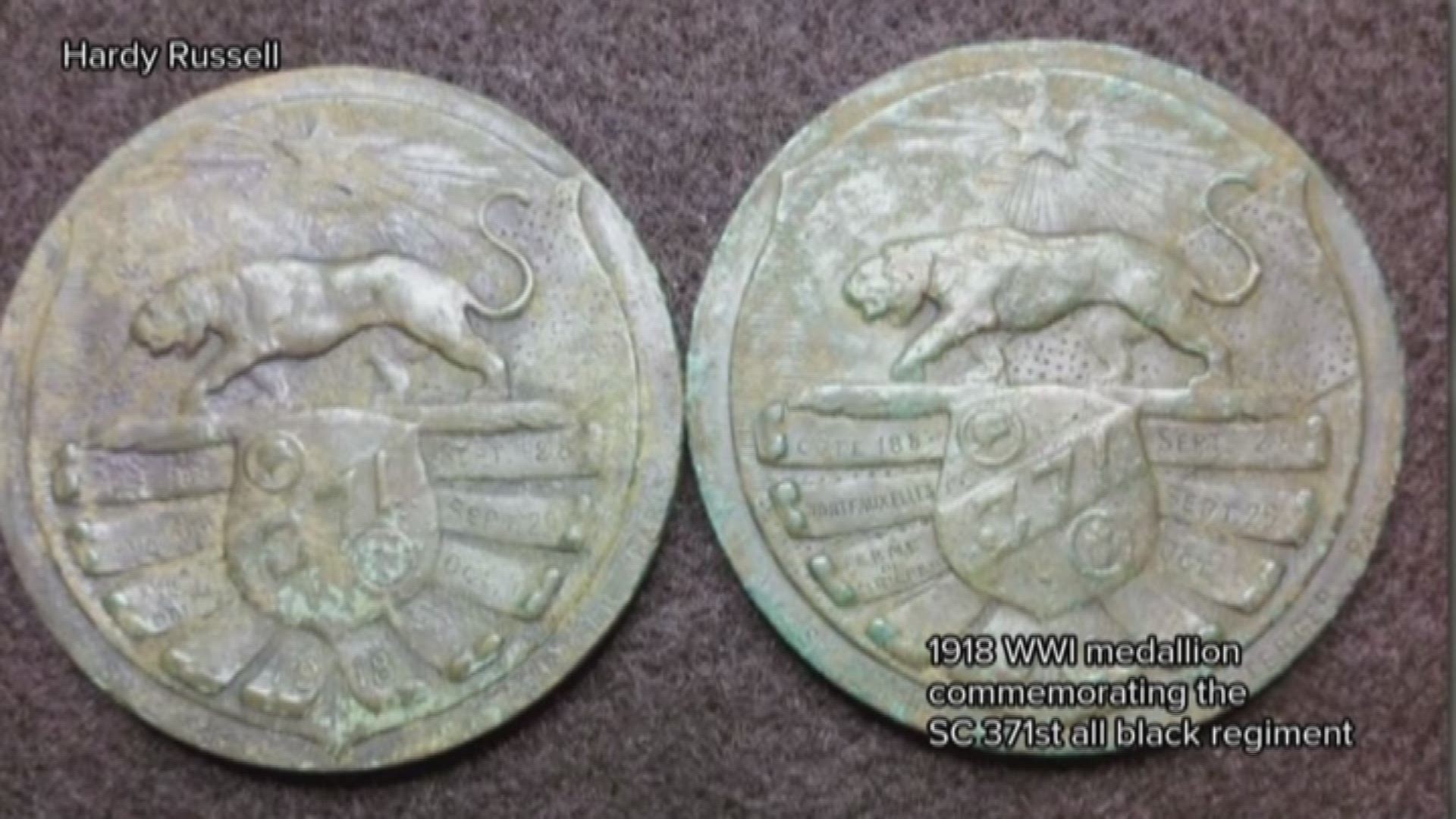SALUDA COUNTY, S.C. — They start early.
South Carolina has an unrelenting summer that begins in spring, so treasure hunting starts practically at the crack of dawn.
Kandi Cochran Ready of Ninety-Six runs the Facebook group SC Diggers, a metal detecting club, which means she is not just well-versed in the hobby, but is instrumental in setting up hunts for the group.
Meeting at a local fast food joint, about 16 members of SC Diggers have shown up on this morning to check out an old home site, complete with a small family cemetery, the residents of which were born in the late 1700s and died in the early 1800s. The four marked graves and three unmarked ones are the only identifiable man-made landmarks amongst some deer stands and a small muddy road that travels into the property, now home to a hunting club.
Most of the acreage has gone back to nature.
Snakes, deer, squirrels, snakes—it seems important to mention snakes twice—are the only ones who now call this home.
Chris Watson, a member of the club from Rock Hill who's an electronics expert by day, mentions being bitten by a copperhead twice. He wears snake boots, but the fangs of a snake struck over the boots. (He thought at first it was just briars). Scratches cover most digger or metal detector enthusiast’s arms. He mentions he would rather be bitten by a copperhead than deal with the chiggers, and he believes scratches just come with the hobby.
Everyone in the group has battle scars and stories.
Chiggers that have covered a treasure hunter’s legs like athletic socks, or mosquitos that take more blood than the Red Cross. Everyone in the club has a story about nature, suggesting that this isn’t the hobby for them. Of course, none of members of SC Dirt Diggers listen.
Nothing is a deterrent -- not the wildlife nor the heat. Most treasure hunters in South Carolina hunt in the woods in the summertime, because it’s impossible to metal detect in the woods in South Carolina in the fall due to deer season. The members of this club have a passion, a real love for finding buried treasure and relics. Most have become mini-historians.
As the group gathers at the site, the humidity is thick. No one is moving too fast, but you can feel the excitement, an electricity emanates from each member.

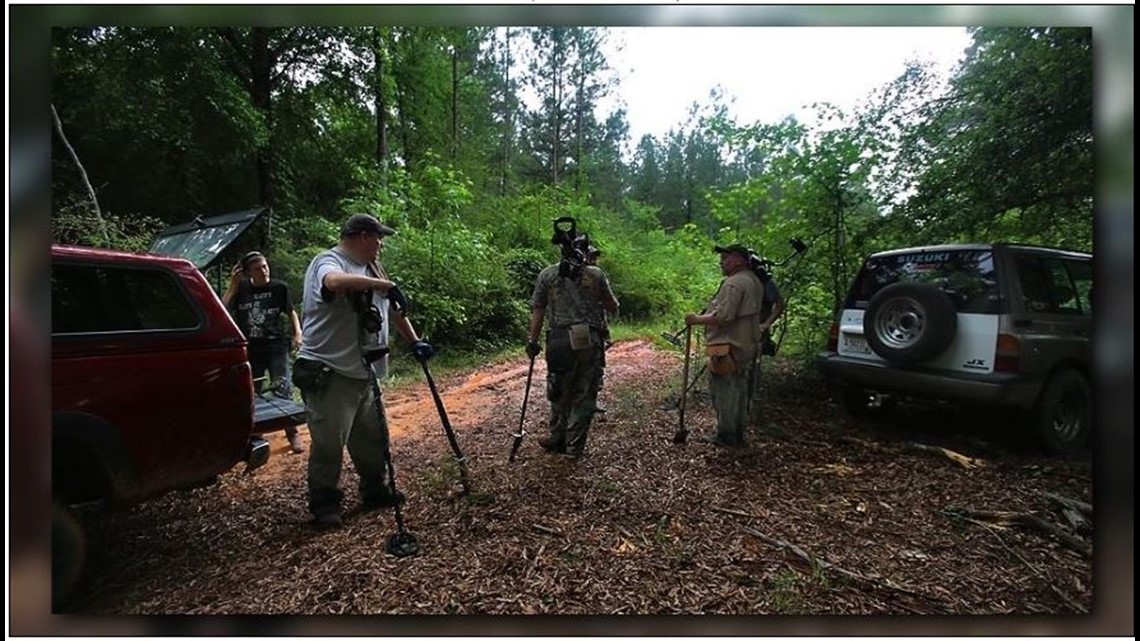
The treasure hunters gather their gear together: a shovel and knife to help dig and cut roots, knee pads, lots and lots of up and down to dig holes, and a carpenter’s belt with a deep bag attached to hold finds. There's also a hand-held metal detecting wand to stick into the hole or run over dirt from a dug hole to pinpoint the metal find. And last, but not least, the metal detector -- that's what the treasure hunters call “the machine.” Everyone has a favorite. Most of the “hunters” have more than one. Some keep the first ones they ever had or the one that has found a great treasure, and they adorn the walls of the treasure hunters, too precious to part with.
The other reason that treasure hunters have so many is that technology keeps getting better and better, which translates into better relic/treasure hunting.
But don’t jump the gun and buy a top of the line machine if you’re thinking of treasure hunting and jumping into the hobby.
Members will tell you to start small, or better yet, to join a club so you can talk to members and find out what you like. Most clubs will let you borrow a detector for a hunt or two to try them out and see what you like best. Club members also recommend going to a local hobby shop and talking to the owners who can also help you get started.
When everything is gathered up, the group sets out. Camouflage is the fashion choice of most. Boots, jeans and shirts tucked in help to discourage blood sucking insects and ticks.
Even though everyone starts out together, they quickly go their separate ways. Some, due to the camouflage, fade in and out of the forest, creating a now-you-see-them, now-you-don’t effect.
The sound of birds mingle with the sound of various beeps coming from some treasure hunter’s machine. Each sound is different, unique for different metals, and each machine has their own distinct sound. Some members of the group wear headphones to help identify the sounds. Parts of the woods sound a bit like someone who keeps hitting the snooze alarm.
“I just really like finding stuff. The thrills," says Anthony Negron from North Augusta, a member of SC Dirt Diggers metal detecting club. “I was following a guy on the beach and then he dug up a watch. I was hooked. “
The Spoils of Treasure Hunting
The overcast sky at the site helps, but most of the treasure hunters are soaked through because of the humidity as they head back to the staging area, metal detectors balanced on their shoulders, to take a rest and grab something to drink and to show each other what they have come up with so far.
As everyone gets back, hands dive into pockets and pouches to show what has been found in the last three hours.
Hands covered in dirt and red clay cradle the finds of each person. With dirt still clinging to it, a Civil War bullet is revealed. No research showed anything about Civil War activity in the area, but the bullet found was a popular kind, in use during the Civil War. How did it get way out here? Then another bullet is shown, found nowhere near the first one, also from the mid-1800s. Could a solider have kept battlefield rifle and these bullets were merely ones that missed a deer perhaps? Were they dropped?
Permission and research, each treasure hunter will tell you, is as important as the machine. Knowing where you are going and what was there is important. Certain places are off-limits. National Parks are a no-no.
You can find the laws about metal detecting in federal and state parks here:
Most South Carolina state parks say no. A few allow and permission must be given by the park rangers to detect at state parks. Any relic, artifact, or treasure found in parks must not be moved and park rangers must be notified.
But here, on private land, what is found is kept.
Most of the treasure hunters don’t sell what they find. Most keep everything, with the exception of pull tabs or beer cans, which are removed and thrown away. Sometimes removing recent metal trash from areas helps to uncover more valuable artifacts or treasure underneath.
At times, treasure hunters will offer a land owner cash to hunt on their land with each club member chipping in. Some property owners don’t care, but all are curious. Some property owners can’t believe how much time is spent unearthing one bullet or button or ring. Above all, each of the group members say permission is important. You don't go on anyone's land without their say-so.
The chirps and beeps cut through the slight breeze whistling through the tree tops. And there are the birds, most likely letting every woodland creature know that their woods have been invaded by folks with beeping machines.
A few more hours provide two more Civil War-era bullets. Buckles from a suspender, bits of metal, old farm machinery and the tip of a sword scabbard, faint scrolling or engraving can be seen peeking through the dirt and the mud. It's more mystery about how these things wound up here.
Many of the diggers will tell you of finding groupings of things. Cannon balls, silver coins—did they fall out of someone’s pocket, or were they buried for safe keeping? Some coins found have holes in them, sometimes one or two. The diggers, who are hobby historians but could probably hold their own against most professors who teach American history, say that folks would sew the coins into their clothing or pockets to keep from losing it. It doesn't appear to have worked very well.
These kind of finds are what keeps these club members coming back. The rush, the thrill, the mystery of how objects ended up where they have. Some can be explained. Some can’t.
Many of the treasure hunters love hunting at the beach. This is where lots of gold is found. Necklaces, rings, pins, all kinds of jewelry.
Every married man in the group readily admits that their wives get first pick of the loot.
SC Dirt Digger club member Richard White from Simpsonville says it was his wife that taught him about the different cuts and carats of diamonds, “and she gets all she wants, “he says.

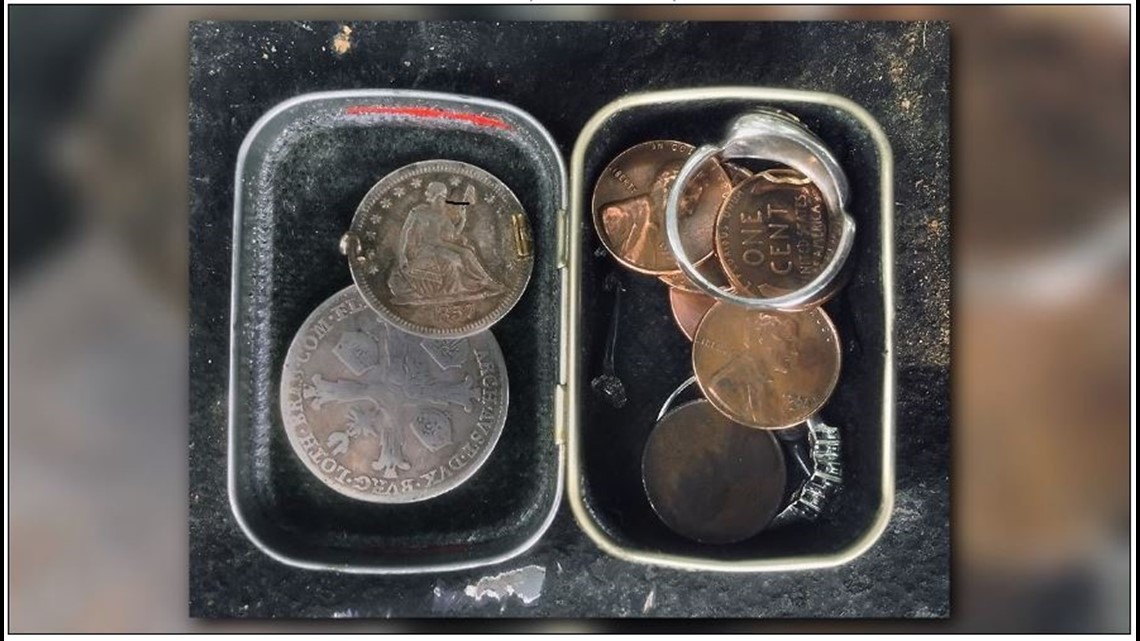
Many of the finds that treasure hunters dig at the beach are the ones that they sell. If they can’t find the owner, then the sale of some of those things goes to fund their hobby. The best feeling, besides finding something great, is being able to find it for someone who has lost something. Most hobbyists love helping folks who have lost stuff at the beach. But each will tell you it’s not a get-rich-quick hobby. One of the members describes it like golf: good exercise, fresh air, sunshine and lots of frustration.
But treasure hunting has the mystique of the unknown -- a gold coin or soldier’s button, sliver and jewels could be right around the corner or right under the tread of your snake boots. A shovel full of dirt, unearths a glint of something.
But as much as this might get your adrenaline pumping and will only increase your hunger to get out more and more, each person in this hobby will tell you they love the people a bit more than the unique finds.
Some have been friends since the second grade, others four or five years, thanks to club introductions.
Earl Mesimer and Danny Boston are both from Orange County, Virginia. Both have been friends since grade school and both are members of the club. They drive down from Virginia to go on hunts with the club.
Many of the club members will tell you to this is the best hobby around.
Fresh air, sunshine, and if your lucky, a pocket full of treasure.
A FEW RESOURCES FOR ALL THINGS METAL DETECTING:
One of the best ways to get started is talk to a club. SC Dirt Diggers Facebook page here.
SC Dirt Digger Club Member Chuck Smith has a YouTube channel called Southern Fired Relic Hunting that shows his travels and finds. He offers tons of tips, including how to dig a hole and fill one in. Southern Fried Relic Hunting
The Detectorists is a Netflix show about two odd metal detectorists. It's a British comedy that you can see here.
SC Dirt Diggers club member Earl Mesimer Jr. appeared in a reality TV show called “Rebel Gold” about a Confederate gold train. Episodes can be found on Amazon Prime. The link for information about the show is here.
Interested in metal detecting jargon? Here is a site that helps break it down here.
P.S. If you are excited to give metal detecting a try, here are a few tips:
- Join a club
- Get permission
- Be respectful to the owners and the land
- Fill in the holes you dig
- Get permission
- Have Fun

